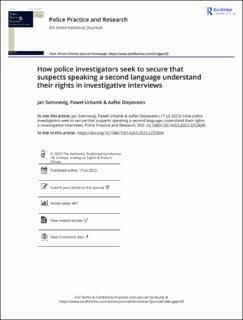How police investigators seek to secure that suspects speaking a second language understand their rights in investigative interviews
Peer reviewed, Journal article
Published version
Permanent lenke
https://hdl.handle.net/11250/3100236Utgivelsesdato
2023Metadata
Vis full innførselSamlinger
Originalversjon
Svennevig, J., Urbanik, P. & Diepeveen, A. How police investigators seek to secure that suspects speaking a second language understand their rights in investigative interviews. Police Practice and Research, 1-19. https://doi.org/10.1080/15614263.2023.2233660Sammendrag
This study presents an empirical investigation of 54 police interviews in Norway conducted with suspects speaking Norwegian as a second language. Using Conversation Analysis as our method, we examine how investigators seek to ensure that suspects understand their rights. We find a range of practices for making rights more accessible compared to how they are formulated in legal acts. Investigators divide their turns into smaller segments and monitor the suspect for displays of understanding along the way. They simplify the syntax and substitute technical terms with plain vocabulary. Sometimes they supplement the wording of the prosecution instructions with explanations or reformulations. In a few instances, they also check understanding by asking a simple yes/no question. However, such questions only generate claims of understanding and no actual evidence of what has been understood. While there are isolated cases of requests to retell the rights, even these practices are problematic in generating strong evidence of understanding. This study discusses the importance of linguistic education and training in police forces for dealing with potential or emerging understanding problems during investigative interviews.

